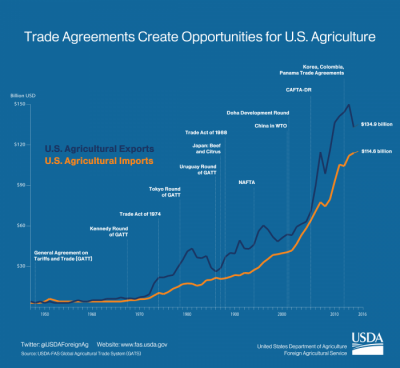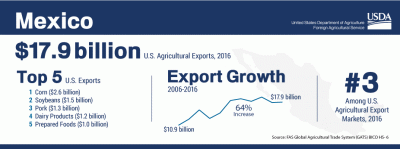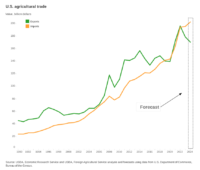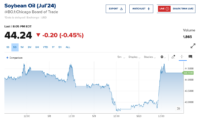Bloomberg's Clarice Couto reported this past Friday that "a surprising tax change in agriculture powerhouse Brazil has the potential to make soy grown in the world’s largest bean exporter less…
Agriculture “Holding Its Breath” as NAFTA Renegotiation Nears
Andrew Soergel reported earlier this week at U.S. News Online that, “As President Donald Trump’s administration sifts through its trade toolbox, preparing to tinker with the North American Free Trade Agreement, the agriculture world is holding its breath.
“NAFTA’s inception in the 1990s contributed to a boom in agriculture trade between the U.S., Canada and Mexico. There’s a general consensus that the agreement isn’t perfect – as made evident by Canada’s recent dairy policy adjustments and America’s newly announced lumber tariffs. But it has also helped facilitate considerable agriculture commerce growth over the last two decades, both at home and abroad.”

Mr. Soergel indicated that, “[A]lthough members of his administration have rarely been publicly critical of the agreement as it relates to agriculture exports, there’s some concern in the industry that tweaks to other aspects of NAFTA could incidentally end up hurting American farmers, ranchers and poultrymen.
‘What really concerns me is that agriculture will somehow be collateral damage in a broader trade dispute related to, you name it, automotives or something where someone in the White House feels a trade deficit needs to be addressed,’ says Joseph Glauber, a senior research fellow at the International Food Policy Research Institute and former chief economist at the U.S. Department of Agriculture.
The U.S. News item, which included a detailed “Q and A” with Dr. Glauber, included this observation: “I think ag feels like they’ve done pretty well in the current agreement, and with the exception of a few groups, most people feel like the last thing you want to do is disrupt what we have in NAFTA. And it’s comforting – I think [Department of Agriculture Secretary] Sonny Perdue has been very strong on this from the get-go. I think he’s been a very positive voice as far as agriculture is concerned for NAFTA in the administration. And I think [Commerce Secretary] Wilbur Ross has said in the last couple of days he wants to do no harm with NAFTA.”
And in response to a question about potential improvements to NAFTA, Dr. Glauber stated that, “But with Canada and the U.S., in particular, there were sectors that were essentially left off the table. And for every sensitive area that the Canadians might have had, the U.S. certainly had their sensitive issues as well. For us, you look at sugar and peanuts and dairy where we didn’t go to zero tariffs. They too protected their supply management commodities, in particular, so that’s poultry, dairy.”
Agriculture Secretary Sonny Perdue was in Canada on Monday; a news update from USDA indicated that, “Perdue conducted a series of meetings with Canadian officials, including Canadian Minister of Agriculture and Agri-Food Lawrence MacAulay and current Premier of Ontario Kathleen Wynne, regarding bilateral trade issues of importance.”
Friendly but frank talk w/Minister @L_MacAulay about U.S. exports to Canada. Foundation for future negotiations w/our friend to the north. pic.twitter.com/Hxwtj0vGYy
— Sec. Sonny Perdue (@SecretarySonny) June 5, 2017
The USDA release quoted Sec. Perdue as saying, “We laid out a great framework to begin renegotiating NAFTA.
“I was able to describe the issues that we feel are important to resolve – and can be resolved – as we begin to renegotiate NAFTA. That has to do, obviously, with the dairy issue and the wheat grading issue that deals with feed grade wheat that’s not grown in Canada. And also certain provincial wine issues, where wines are not displayed out in front where other Canadian wine is.”
NAFTA renegotiations/dairy issues- some of the topics @SecretarySonny discussed w Canadian leaders Monday https://t.co/2csPXpufUP (MP3-1min) pic.twitter.com/zS5Q8dyrFI
— Farm Policy (@FarmPolicy) June 6, 2017
Meanwhile, Iowa pork producer John Weber, a past president of the National Pork Producers Council and current chairman of its Trade Policy Committee, penned an opinion column this week in The Des Moines Register (“Withdrawing from NAFTA could devastate U.S. farmers“) where he indicated that, “Farmers in Iowa and across the nation are particularly worried about the renegotiation of the North American Free Trade Agreement, the 23-year-old deal among the United States, Canada and Mexico.”
“Mexico is particularly important to Iowa farmers. The top three U.S. farm exports to that country are corn, soybeans and pork, with a combined $5.4 billion in 2016, and Iowa happens to be the No. 1 U.S. producer of those commodities,” the Register column said.

Mr. Weber indicated that, “But what U.S. farmers like me can do without is any disruption in trade with our neighbors to the north and south. And withdrawing from the deal, which still is a possibility, would be devastating for American agriculture. U.S. pork producers would be particularly hard hit if exports to their No. 2 (Mexico) and No. 4 (Canada) markets were interrupted. In 2016, more than a third of U.S. pork exports — $2.2 billion worth — went to those two countries.
“Iowa State University economist Dermot Hayes calculated that if Mexico placed a 20 percent duty on U.S. pork — a likely response to a U.S. withdrawal from NAFTA — and allowed other countries duty-free access, the U.S. pork industry eventually would lose the entire Mexican market. That would result in a loss of 5 percent of U.S. pork production at a cost of $14 per hog; the cumulative impact on the U.S. pork industry would be $1.7 billion.”
Pork producers @NPPCWPX say NAFTA benefits have been 'huge,' ask @POTUS Trump to "do no harm" when it comes to trade renegotiations.
— donnelle eller (@DonnelleE) June 8, 2017
Mr. Weber added:
By all means, update NAFTA, but let’s make sure the tremendous benefits of that agreement are maintained in any renegotiated deal.
For additional information, see this NPPC white paper, “Modernizing NAFTA and Safeguarding U.S. Interests A Summary of Issues and Risks.”







